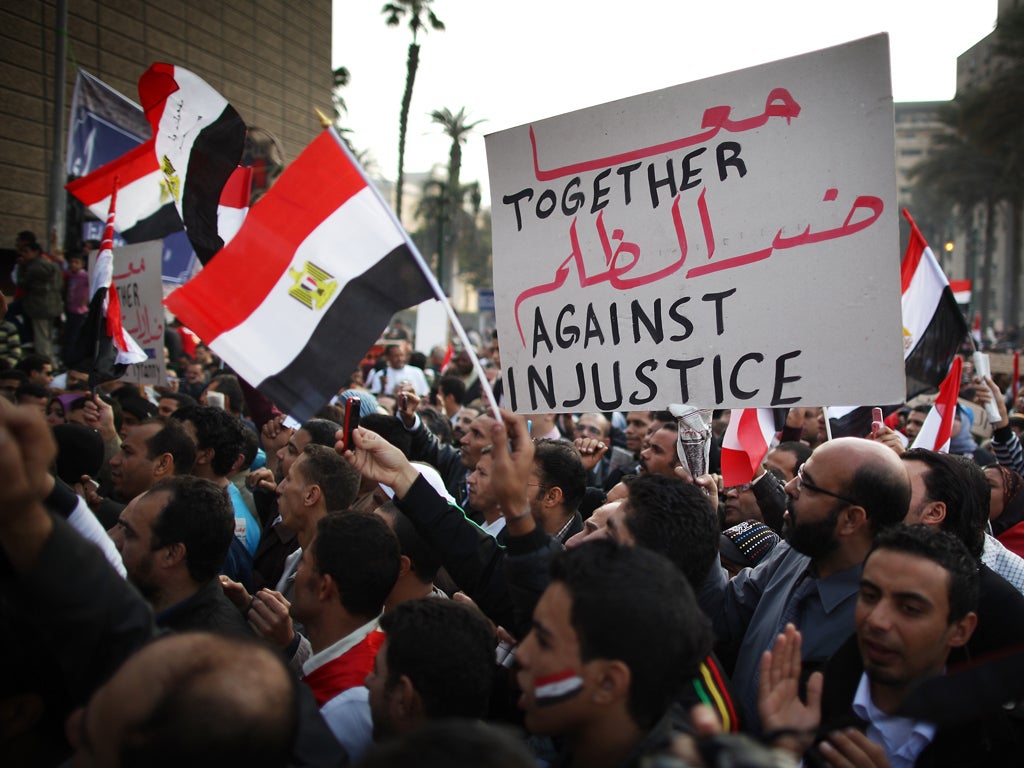Get real, the Arab Spring is no endorsement of the West
Tunisia, Egypt, Yemen: these uprisings in the Middle East all targeted governments that were backed by the West.

There is nothing Western leaders would like more than to “own” the Arab Spring. Both Barack Obama and David Cameron were at it this week at the UN; Obama the more reasoned in the light of anti-American protests which had killed his Ambassador to Libya; Cameron the cockier, railing against the Syrian president and against Iran.
But both in their way were facing the same problem. On the face of it, the uprisings across the Middle East should be working in Western favour, with their calls for democracy, freedom and openness. And yet, as Obama acknowledged, “the events of the last two weeks speak to the need for all of us to address honestly the tensions between the West and an Arab World moving to democracy”.
If only we could, but the US President’s speech was itself an example of just how wide the gulf of understanding has become. No one expected him to launch into any great soul searching let alone new initiatives. You don’t win elections in America on foreign policy, but you can, as President Carter discovered to his cost after the debacle of the Iranian hostage crisis, lose them if the public feels national prestige is at stake.
Hence Mitt Romney’s attempts to pinion Obama as a weak-kneed leader in the face of the anti-American riots sweeping the Arab world, and hence Obama’s decision to concentrate the opening of his US address on the death of the ambassador to Libya, Chris Stevens, and the need to confront extremism.
There are many, not least in Libya itself, who would agree with him. The Arab Spring was intended to overthrow the nexuses of corruption as much as political suppression, but not to close off commercial opportunities by assaulting the embassy of the world’s richest country.
But, in that, the protesters are also attacking a system of cronyism and oppression which is associated with Western support. It is all very well rejoicing in the fall of Col Gaddafi, as David Cameron did again at the UN on Wednesday, and to talk of the uprisings in Tunisia, Egypt, Yemen and elsewhere as if they were warm and friendly moves to Western norms. But none of them was started with Western assistance, and all of them arose against Western-backed governments.
Obama talks, as so many other US presidents have, in terms of American “ideals of democracy and freedom”. “We were inspired by the Tunisian protests that toppled a dictator,” he declared, “because we recognised our own beliefs in the aspirations of men and women who took to the streets. We insisted on change in Egypt, because our support for democracy put us on the side of the people.”
Absent from his list, of course, was Bahrain, where peaceful protest was put down violently with the help of foreign intervention by Saudi Arabia. Unmentioned in his castigation of Iran for supporting violence abroad was his recent decision to remove Mujahedin-e-Khalq, the thoroughly nasty Iranian exile organisation, from the list of terrorist groups banned from US aid. Obama talked of violence against civilians while ignoring US drone attacks on foreign soil. He declared that a “nuclear-armed Iran is not a challenge that can be contained”, although the one nuclear-armed country in the region which steadily refuses outside inspection or to join the Non-Proliferation Treaty is Israel, to whom Obama has just increased military aid.
These are not just debating points. Little fuels the fire of anti-American and anti-British feeling around the world like the charge of Western hypocrisy. It permeates almost every political discourse. It will only be met when the West takes decisions which seem clearly apart from its own interest.
The litmus test of that, as Obama knows full well, is the issue of Palestine. And that, as Mitt Romney’s campaign has made clear, is out of court so far as Washington is concerned.
Flies to the Caucasian honeypot
While at the UN, David Cameron talked of the need for “fair economies and open society”. Back in oil-rich Azerbaijan, where the Aliyev dynasty reigns supreme and inviolate, the British are paying court with unrestrained enthusiasm.
The country was the subject of a fringe reception at the Lib Dem conference, attended by more than 100 people. Christie’s auction house has made the country the object of its next expansionary ambitions. Tony Blair has inevitably popped up as a friend of a local oligarch.
You’d have thought that something had been learned from the farce of the Eurovision Song Contest held in Baku in April. But no. When Christie’s visited this month, its partners were the Heydar Aliyev Foundation, headed by the President’s daughter-in-law, and the Yarat! Contemporary Art Space, promoted by the president’s niece.
The British ambassador to Azerbaijan was recently quoted as saying that the country “was isolated for so long under the Soviet Union, but now has clear aspirations to enjoy the good things of life, including Western art and culture.” A US diplomatic cable, revealed by WikiLeaks, put it rather differently, comparing it to “the feudalism found in Europe during the middle ages”.
a.hamilton@independent.co.uk
Join our commenting forum
Join thought-provoking conversations, follow other Independent readers and see their replies
Comments
Bookmark popover
Removed from bookmarks